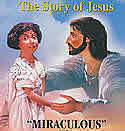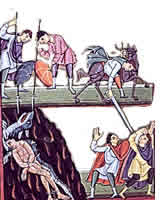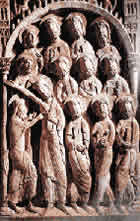| |||||||||||||||||||||||||||||||||
| Getting Started | Facts > Triumph > Apostolic Legend |
| Hellenism | Syncretic Judaism | Jesus legend | Jesus Scholarship | |
|
|
Apostolic Legend | Apostolic Scholarship | Over Paganism | Over other Christianities |
| The myth of apostolic succession |
|
Let's talk about the traditional story of how we got the news about Jesus—technical people like to call this the story of "apostolic succession." Remember that term, sometime you may use it at a cocktail party and look really smart—or am I thinking of "smart-ass"? Then we'll look at how that story held up to the last 250 years of critical scholarship. |
| The set up is about Jesus. The story itself is about how Christianity got from Jesus to the New Testament. You maybe learned all this in Sunday school, but even if you aren't a believer, this is probably history as you know it. |
|
The set up Christianity was founded by Jesus, who saw Himself as God's son. Jesus was a powerful figure who amazed people, gathered disciples, taught, did miracles, and was killed by the Romans, after which he appeared to his followers then ascended to Heaven.
By and by some of the apostles who knew him, Matthew, Mark, Luke and John, wrote books, "gospels," that are histories of Jesus' life and resurrection. Luke stretched out his gospel with Acts of the Apostles, which includes the history of the early church. Paul and other apostles wrote letters. |
“In Paul’s copious writings, so fervently focused on the redemptive death of Jesus Christ, there is no mention of the [passion] saga we all know so well: the triumphal entry on an ass, the crown of thorns, the confrontation with Pilate. If Paul, writing only a decade or two after the crucifixion, knew about such theologically potent details as Jesus’ prayer in Gethsemane or his dying words on the cross – “Father, into your hands I commend my spirit” – how could he not have expounded on them? The answer that comes to mind is the same one that comes to mind for the virgin birth story: he didn’t know the features of the passion story because they hadn’t been invented yet.”[Russell Shorto, Gospel Truth, 1997, 170] |
|
Finally the gospels, Acts, and the letters were put together into a book, the New Testament, an authoritative history of Jesus' life and ministry and of the earliest Church. The great thing about this story is that it guarantees the New Testament is authentic and accurate. We got the story of Jesus from the pens of the people who knew him. Leaving aside the miracles and resurrection business, which some people don't swallow, it's a good story. It's simple. It's clear. It's internal logic makes sense. It hangs together.
It's also a myth. I'll explain why on the next page. For now, let me tell you something you maybe didn't know. The orthodox Romans weren't the only early Christians to trace their saying and gospels right back to Jesus. All the early Christians, orthodox or heretic, justified their teachings with apostolic succession. What's more, they ran short of apostles, and ended up using the best ones over and over. For example:
Modern scholarship says the myth of apostolic succession developed this way: the people who knew Jesus didn't need a written record, they knew Him. They did pass on a record of Jesus' sayings, first as an oral tradition, eventually written down in a book modern scholars call The Synoptic Saying Source, aka Q. For a couple or maybe several generations, that was enough. Then as different Christian theologies developed and lots of of mutually incompatible gospels were written in the second century, the various new Christianities each looked for ways to validate their own version of the faith. One standard technique was to invent a chain of authority back to the founders of the faith. To invent the myth of apostolic succession. Now you know. |
|
Good Books for this section
|
Ancient Christian Gospels Their History and Development
|
Do you know the oldest surviving manuscript for John? How about Mark, Matthew, Luke? When were each of the gospels first mentioned by another Christian writer? What is the evidence about who wrote them? How about the Gospel of Thomas, the Egerton Gospel, the Synoptic Sayings Source, and other early non-canonical gospels? They're here too. You'll even find detailed analysis of the late first and early second century Apostolic Fathers' (Clement, Polycarp, Ignatius) gospel quotations. [Hint—there aren't any; but the Apostolic Fathers did quote gospel-like saying of Jesus from other sources.] Why does this matter? Because it shows that the gospels themselves are not reflected in any Christian records until the second half of the second century! A well written, readable, but extremely technical scholarly analysis of the early Christian writings. Too detailed for beginners, but a fascinating read for advanced students and an excellent reference.
|


 The
story
The
story


